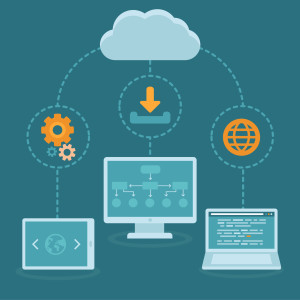 Have you been following our series that chronicles how state tax legislation applies to various technology industry niches? So far we’ve covered medical device companies and software companies; today the topic is Software as a Service (or SaaS) companies.What multi-state tax issues do they face when it comes to nexus, sales and use tax, state tax legislation and more? Keep reading to find out.
Have you been following our series that chronicles how state tax legislation applies to various technology industry niches? So far we’ve covered medical device companies and software companies; today the topic is Software as a Service (or SaaS) companies.What multi-state tax issues do they face when it comes to nexus, sales and use tax, state tax legislation and more? Keep reading to find out.
An Overview of SaaS Companies
SaaS is defined as, “A way of delivering applications over the Internet – as a service. Instead of installing and maintaining software, you simply access it via the Internet, freeing yourself from complex software and hardware management.”
Chances are, you’ve used SaaS without ever realizing it. Cloud-based services are those you stream directly from the Internet, and they can come in different forms, but with similar characteristics. The National Institute of Standards and Technology (“NIST”), a division of the Department of Commerce, defines cloud computing and lists the five essential characteristics of an SaaS platform as: “On-demand self-service, broad network access, resource pooling, rapid elasticity and measured service.”
Top SaaS companies include:
- Oracle
- SAP
- Cobweb
- MuleSoft
- Salesforce
- Akamai
- CA Technologies
- Adobe
- Microsoft
- Intuit
State Tax Issues for SaaS Companies
As we’ve seen with the other technology niches, there are several state tax issues relating to SaaS companies:
- Nexus: As with all companies engaged in multi-state activities, it’s important to first determine where the company has created nexus (taxable presence). Various things typically create nexus for SaaS companies. Primarily, SaaS companies are often growing quickly and sending a traveling salesforce (either their own employees or third party contractors) to customer locations, which can create nexus. In addition, SaaS companies tend to either rent server space at different locations across the country, or have their own servers housed at various locations.
- Taxability Part of the challenge for SaaS companies is in the definition of the product or service itself. Its very name, “Software as a Service,” causes confusion for state agencies. Historically, we’ve dealt with either tangible personal property (mostly taxable) or services (taxable if specifically enumerated). We’ve also dealt with intangible property over the years. But SaaS doesn’t clearly fall into any of those categories. In many states, if software is downloaded electronically it’s considered exempt, yet in others it’s taxable no matter how it’s delivered. But what if it’s defined as a service, and not as software? Then what type of service is it defined as? Does it fall under a category like information services? When it comes down to it, there are a lot of different ways states could interpret their definition of nexus. If you’re interested in more about the questions surrounding SaaS companies and nexus, read this blog post.
- Sales Tax: The online sales tax debate comes into play here. Do SaaS companies sell products or services? If they’re stored in the cloud, are they a tangible good that is subject to sales tax? Or are they a taxable service? Unfortunately, the interpretations vary from state to state. As this post explains, some states like California don’t tax SaaS because they don’t tax the electronic download of software. Other states, like New York, do tax the download of software, so they do tax SaaS. Still, some states consider it data processing, so if it’s taxable in the state (like it is in Texas), then it is taxable.
- Income Tax: If it’s determined a SaaS company creates nexus for sales tax purposes, they’re potentially responsible for income tax as well. One of the issues dealt with in the industry related to income tax is the sourcing of the income. In general, regarding the sources of services income, market-based sourcing (to where benefit is received by the purchaser) is a growing sourcing methodology for states. However, many states are still sourcing sales based upon where the greatest “cost of performance” occurs. As such, determining where an SaaS company should apportion its sales revenue can be a challenge.
How Miles Consulting Assists SaaS Companies
We work with our SaaS clients on all of the topics mentioned above. The subscription SaaS platform may be the primary revenue stream a client faces, or it may only be a small part of their overall revenue. Many of our clients sell a hardware product of some kind that also has a SaaS/cloud component. And some are strictly SaaS clients. We assist them in determining where they have nexus. Then, once nexus is determined, we help them determine the taxability of SaaS in those various states. To add to the challenge, some states have not yet made a definite determination in their taxability of this revenue stream, leaving some uncertainty and room for interpretation. As such, we work with our clients to determine a practical approach in reaching a conclusion and keeping up with any changes. Finally, we assist in the determination of sourcing their revenues (both for income tax and sales tax purposes).
When we approach a project with a new client, we develop a comprehensive plan that includes coverage of all the state tax issues – sometimes including retroactive remediation (like Voluntary Disclosure Agreements) and a solid plan going forward.
As you can tell, there are a lot of issues surrounding SaaS companies and state tax legislation. As they continue to grow and expand, legislators will need to further define if these businesses are providing tangible goods, taxable services or something else altogether.
What other technology industry niches are affected by multi-state tax issues? Stay tuned for the next post in our series where we’ll discuss digital goods!
Miles Consulting Group, Inc. is a professional service firm in San Jose, California specializing in multi-state tax solutions. Our firm addresses state and local tax issues for our clients, including general state tax consulting, nexus reviews, tax credit and tax incentive maximization, income tax and sales/use tax planning and other special projects, including Voluntary Disclosure Agreements. To learn more, contact us today at www.MilesConsultingGroup.com.














